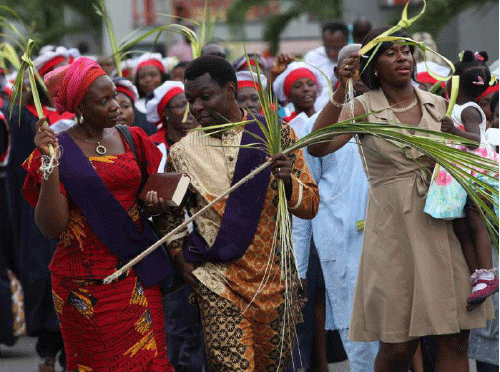Worldwide, most Pentecostal churches do not follow orthodox churches’ tradition. But things seem to be changing, as Woman Editor, TEMITOPE DAVID-ADEGBOYE, witnessed the celebration of Palm Sunday by Winners’ Chapel last week and reports that it was an inspiring experience
Christians celebrating Palm Sunday
Last Sunday, Christians all over the world celebrated Palm Sunday, commemorating Jesus Christ’s triumphant entry into the holy city of Jerusalem about 2,000 years ago. They sang, bearing palm fronds as they celebrated.
Orthodox Easter consists of a series of celebrations (movable feasts) commemorating the resurrection of Jesus Christ. In Eastern Orthodox Christianity, the spiritual preparations begin with Lenten period, a 40-day period of self-examination and fasting, which starts on Clean Monday and culminates on Lazarus Saturday. Clean Monday falls seven weeks before Easter Sunday.
In other climes, Lent starts on Ash Wednesday and ends on Holy Saturday, a day before Easter.
In this part of the world, Palm Sunday is followed by Holy Week, which ends on Easter Sunday.
And although the Pentecostals believe in the efficacy of fasting in any Christian’s life, the Lenten period is not given prominence. Many of these churches organise their fasting period before or after this season.
So when Bishop David Oyedepo, the presiding bishop of Living Faith Church Worldwide (also known as Winners’ Chapel) announced to his congregation on Sunday April 6 to bring along with them palms fronds in celebration of the Palm Sunday on April 13, excitement filled the air, as they all looked forward to a joyous celebration.
As early as 5am, multitudes holding fresh palm fronds (with some holding a branch) trouped into the Ota headquarters of the church, not just to celebrate any other Sunday service, but also to commemorate the Palm Sunday. The service also doubled as ‘Healing Banquet Service’.
As usual, each of the four services began with ‘high praises’ led by the praise team. The joy of the members witnessing yet another triumphant entry of Jesus Christ into Jerusalem in preparation for his suffering and death on the cross knew no bounds. This was followed by a call-to-service with Pastor (Mrs.) Faith Oyedepo leading the congregation in reading Psalm 121. Then the announcements were taken, followed by testimonies from members.
The choir’s ministration preceded the bishop’s message for the day.
Oyedepo began the sermon by stating: “We recognise the resurrection of Christ, as it is the basis for Christianity”. He affirmed that the triumphant entry service/healing banquet service is significant because God does not change, and so whatever He was found doing in the past, the One who is and who is to come is still able to do the same today. Jesus healed the sick and delivered the oppressed. In his message titled ‘Walking in the realm of the miraculous: Engaging the ministry and power of angels in powering the miraculous’, Oyedepo stated that angels are divine agents of the supernatural, so they are very vital in the supernatural body of Christ. Christ, he said, put them to use and so, we are expected as His followers to do the same for results.
He further noted that: “Angels are spirit personalities, who operate as flames of fire. They are unstoppable; they are agents of divine rescue; they are agents of divine judgment; they are agents of destruction; they are agents of rescue and protections; and they are also agents of supernatural Church growth.”
According to him, angels are all around; but we must learn to engage them. The only way to engage angels, according to him, include: Belief in their mission, engaging them through prayers, issuing faith-filled commands to them, refusing to be afraid because it takes faith to put these angels to work, and always saying what the Word of God says to keep them on duty.
The service was rounded off with Holy Communion, which, according to him, “is a mystery for full restoration of health of His people”. The bishop prayed that nothing is permitted to die in those that partake in the communion.
The event was marked by procession by both the clergy and the laity, who carried palm fronds, singing and dancing.













